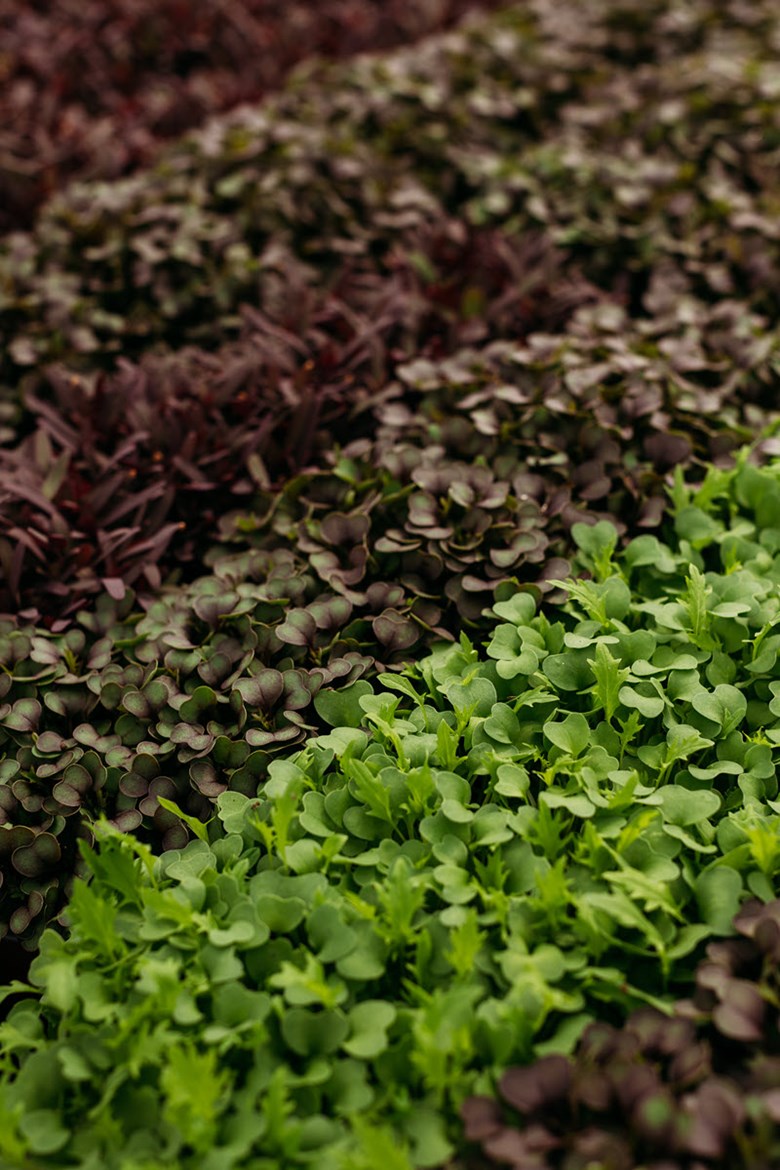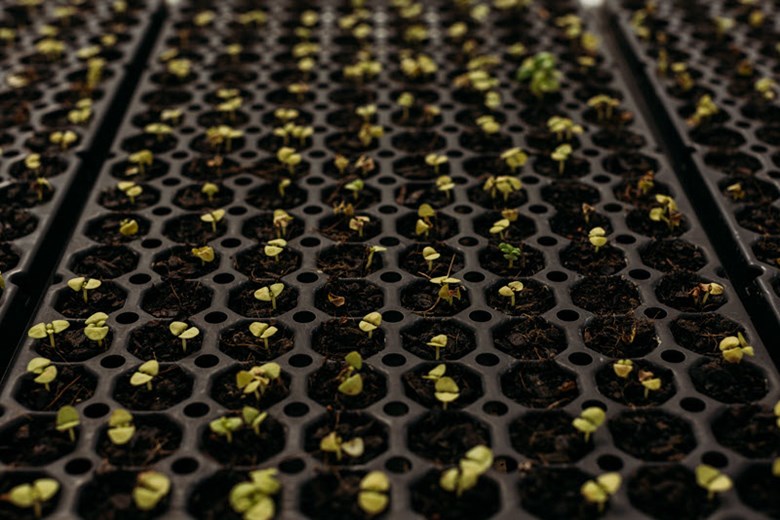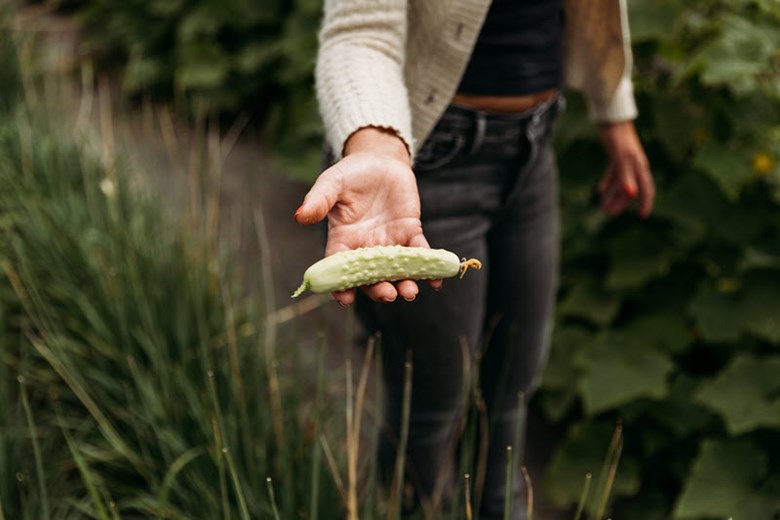A leader in microgreens and horticulture, Elle Brown talks about her new future.
Until January this year, planting, pruning and just generally making things grow is what filled Elle Brown’s days. Founder of Newcastle Greens, Elle built an incredible business with business partner Dylan Abdoo, which saw her importing never-before-seen seeds into Australia, and producing microgreens, vegetables and edible flowers that were in demand by some of Australia’s best restaurants. .
Years of hard manual labour have, however, taken their toll and in January this year Elle moved on from her first ever ‘real’ business and established Bank of Seeds.
Speaking with Elle as a part of our International Women’s Day Series, Elle takes us back to where it all began, her frustration of not being recognised and where the future lies. Here’s our chat...
Have you always worked within the horticulture industry?
No I haven’t, I used to live in Sydney and worked at the Opera House for 12 years in front-of-house, as well as at the Opera Bar. I was a single parent at that time and worked three jobs. I also used to make cakes and sell them to cafes, which I’ve done since I was 14.

I then began working for a literary agency as an office manager as well as general office duties, I worked with the estates, like Dorothea McKellar. I also had the fun job of reading through the submissions. Everyone wants to write a book, so I had to find the gems, which was rare (laughs) and pass them onto the agents.
You launched the business Newcastle Greens, how did this come about?
I started the business in 2012, starting with microgreens, we initially grew everything in our backyard before moving to a larger property in Cooranbong.
When I had my son and moved to Newcastle I didn’t want to go back into hospitality, and there weren’t any literary agencies here, so I thought what could I do? That’s when I started growing wheatgrass, which was very up and down, so I moved into micro greens and it went from there.
Did it take a while to get the attention of chefs/restaurants?
It took a long time, I spent the next three years getting the product out there and approaching chefs and restaurants.

At the time, microgreens were grown by a couple of big scale farmers and grown hydroponically, under lights. Newcastle Greens was different in that all our products are hand grown, and no sprays or chemicals are used which means the product is more expensive. So it was important that the chefs tried our products and I would meet with them to discuss this, and explain how the product held up better because it’s grown in sunlight.
How receptive were chefs to having those conversations with you?
Some were like no, I’ve already got them and not even talk to you, and some of the chefs were very rude, more rude than what they would have been if they were dealing with a male.
I also used to get really frustrated that many would refer to Dylan when it came to the business, and I was just in the background. It’s definitely changed and has gotten better, but in the early days it was frustrating.
Would you say chefs were more open to dealing with you as time went on?
Yes, in the beginning it was the case of getting samples out to as many people as possible, there wasn’t that need to chase restaurants which was great.
Chefs such as Peter Gilmore from Quay and Rob Cockerill from Bennelong would come to us suggesting varieties, and we’d grow specifically for them.
Was there a turning point for the business that you can remember?
Yes I would say it was in 2015 when I finally acquired the rights to grow Lamborn Peas, which was following nearly 2 years communicating with Rod Lamborn and trying to working through importing them into Australia. I am the only farmer who has the rights to grow Lamborn Peas in the country and I have 6 different varieties.
Soon after this happened we won a delicious produce award for both microgreens and the Lamborn Snap-Greens, it was after this I started getting interest from people like Peter Gilmore and it went from there.

When I left Newcastle Greens the business was supplying 88 restaurants in Newcastle, the Hunter Valley, and Port Stephens regions as well as restaurants in Sydney, Wollongong and Canberra. It’s come a long way from my first big sale with the head chef at Talulah at The Junction, Anthony Kocon (now owner/chef of East End Hub). I received a standing order of 3 dozen a week and I remember thinking ‘I’ve hit the jackpot’ (laughs).
Looking back at that now it’s nothing, you can’t start a business with that, I didn’t realise it at the time but I had a long way to go.
How have you acquired all of your knowledge about microgreens and seeds and how to grow them?
I didn’t have a background in horticulture. I planted trees for a year at Babinda in bush regeneration for the Council, other than that it’s all been learning as I go.
Sometimes I think it’s been beneficial that I wasn’t stuck in that fully trained mindset, because you tend to take risks you otherwise wouldn’t have if you had the knowledge, and sometimes we pulled it off. Like the Lamborn Peas, because who has ever seen a red pea before? not me, and I thought I’m going to go after them.
Lamborn Peas are still a big seller, we can only do two seasons a year so people look forward to it. There’s also that excitement of having a product that no one else has on the market.
What have been some of your biggest challenges?
Imports are a nightmare. It’s increasingly becoming more difficult to get certain seeds into Australia, the restrictions have tightened a lot compared to when I first started, due to biosecurity laws. If I have to treat a product, I have to pay to treat them which is expensive, but if I don’t they get destroyed.

The weather has been shocking, all the produce was lost during the rains last year. Excessive rain then brings on powdery mildew, which in leaf and edible flower production this can ruin the product. Vegetables not so much, but kills the plant eventually. Following the rains, waterhens arrived, which was a first, and they’d come in and eat all the newly planted seedlings. We also had rabbits to deal with. The last few years have been pretty heart-breaking, with drought, Covid lockdowns and floods, but you have to remain positive otherwise you wouldn’t do it.
What are the conversations like with chefs when you can’t produce certain products because of reasons you’ve just mentioned?
Chefs are getting better, in the beginning we used to get some attitude, and I remember I used to get so nervous before having those conversations, and I still do to a degree as you don't want to let people down. However, because farmers have had some many problems in the last few years, chefs and people are starting to realise it’s not because we’re doing anything wrong, it’s out of our control and it’s across the board and they are more understanding.
You have just recently moved away from Newcastle Greens, what is it you’re doing now?
Yes, as of January this year I finished working with Newcastle Greens, I am still continuing to grow microgreens and will sell them back to Newcastle Greens but my focus will be more so on my new business, Bank of Seeds. I will continue to grow Lamborn Peas - but will need to lease some land and set myself up again.
The years of hard manual labour has messed with my body, and I'm not getting any younger. I realised I couldn’t continue doing this job to the same capacity forever. Seed and sourcing seed has always been one of my passions and I can see there is a lot of scope for the business to grow, so watch this space…
If there was one bit of advice you could give yourself back when you first started the business what would it be?
I would back myself way more, not take things to personally and not give away all your business secrets to others.




